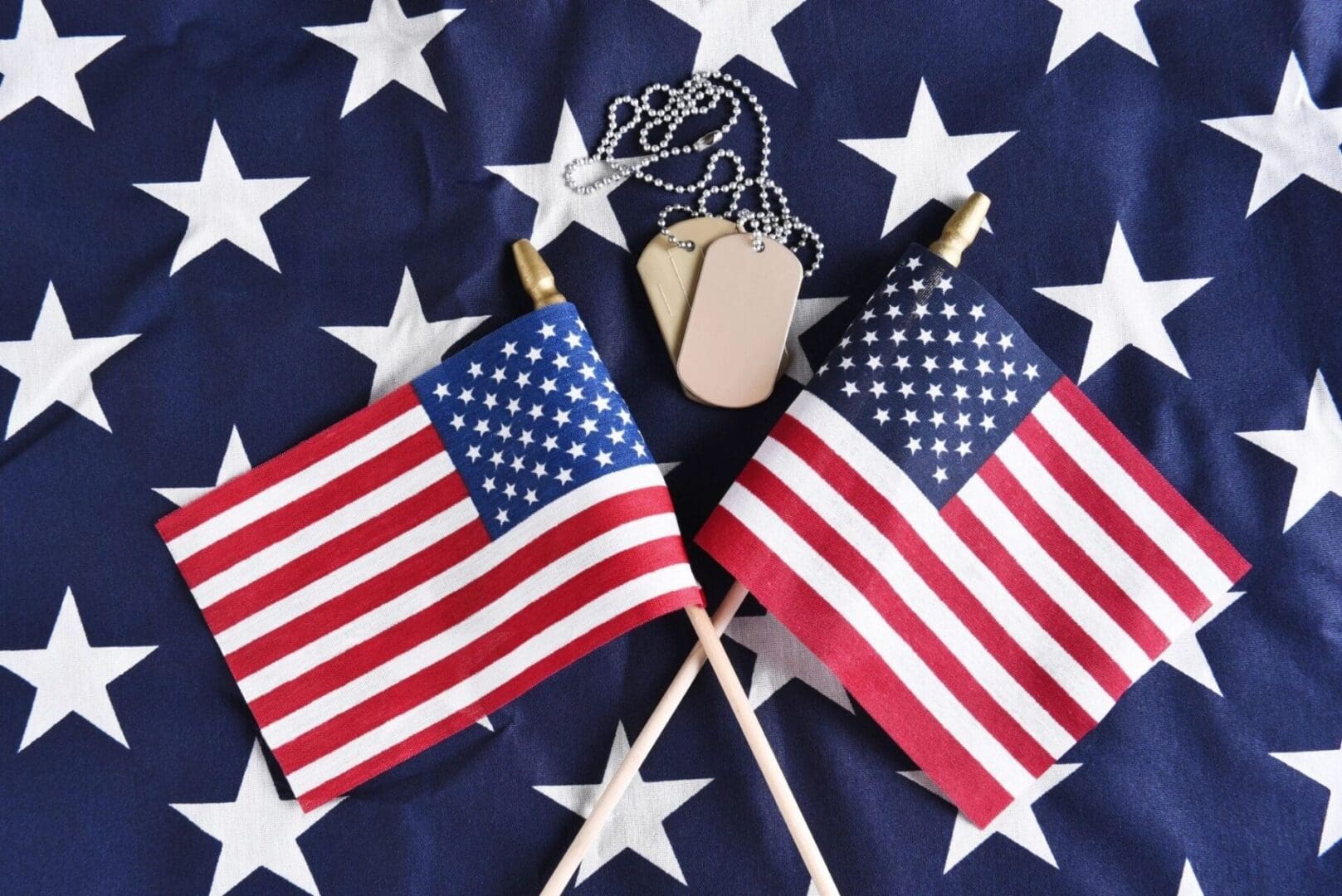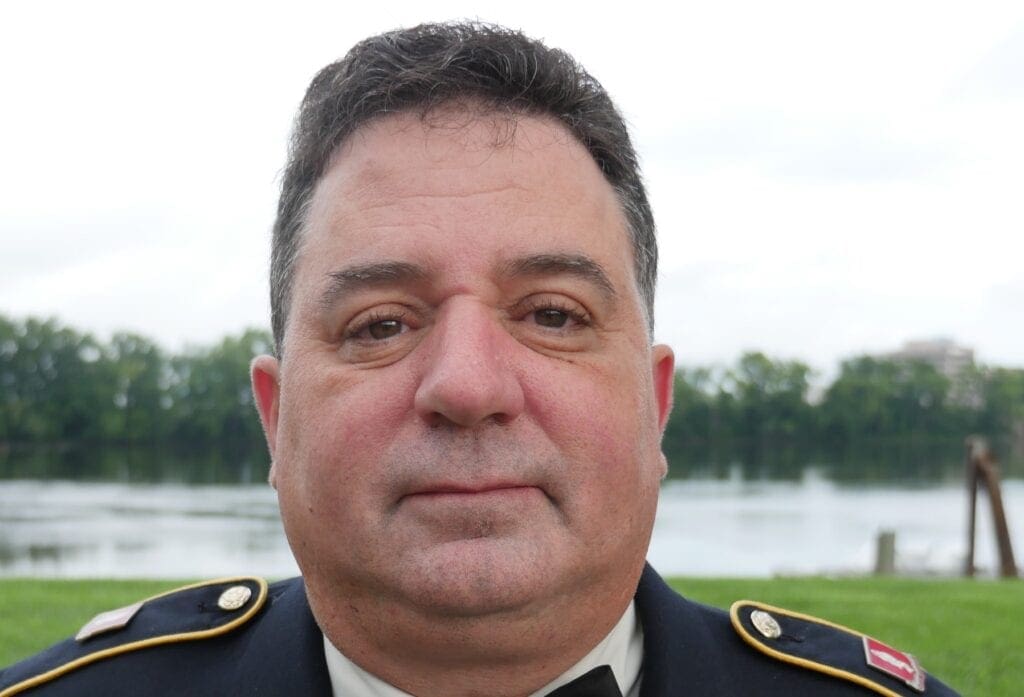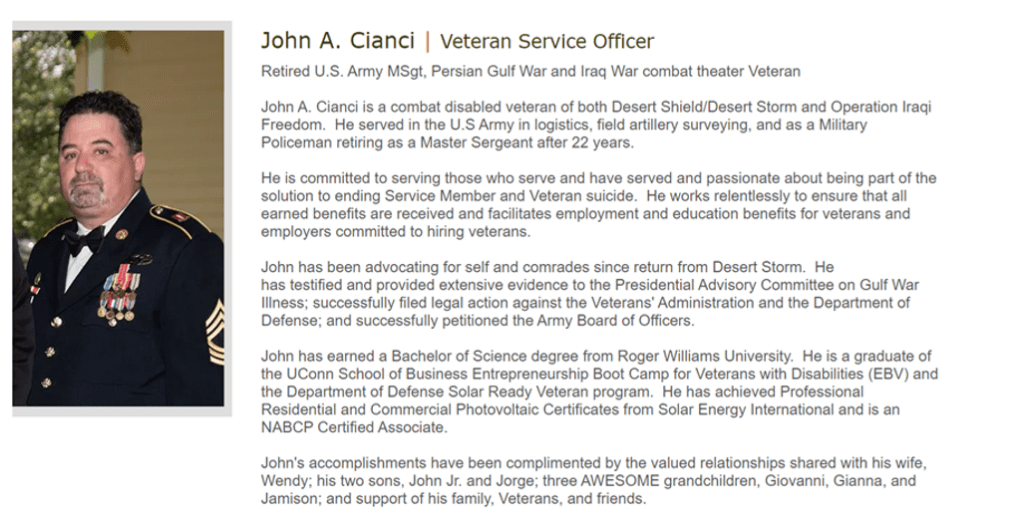Search Posts
Recent Posts
- Writer Herb Weiss’ 45 years of Advocacy on Aging now Archived at Rhode Island College Library Special Collection June 23, 2025
- Providence Biopharma, Ocean Biomedical, Notified of Termination of License Agreements with Brown University, RI Hospital June 23, 2025
- Networking Pick of the Week: Early Birds at the East Bay Chamber, Warren, RI June 23, 2025
- Business Monday: Dealing with Black and White Thinking – Mary T. O’Sullivan June 23, 2025
- Rhode Island Weather for June 23, 2025 – Jack Donnelly June 23, 2025
Categories
Subscribe!
Thanks for subscribing! Please check your email for further instructions.

“RI Veterans: Did you know?” – by John Cianci
By John A Cianci, Department Veteran Service Officer, Italian American War Veterans
VA Caretaker Program provides monthly non-taxable stipend to spouse or family/friends
The Veterans Administration (VA) Program of Comprehensive Assistance for Family Caregivers (PCAFC) pays a monthly, non-taxable stipend up to an estimated $2,000 a month for a spouse or family member or friend to provide personal care services to an eligible Veteran so she/he can remain living at home. The care or assistance can be needed to support the Veteran’s
- Health and well-being
- Everyday personal needs (feeding, bathing, and dressing, for example)
- Safety, protection, or instruction in their daily living environment
Additionally, Eligible Primary Family Caregivers may also receive access to health care benefits through the Civilian Health and Medical Program of the Department of Veterans Affairs (CHAMPVA)—if you don’t already qualify for care or services under another health care plan.
For example, I had a friend who was unemployed, no health insurance, and required to provide court ordered health insurance to his children. He was qualified as a caregiver as an extended family member for a veteran. The VA allocated 20 hours per week of caregiver services, which allows him access to ChampVA healthcare not only for himself, but also children while he was a caretaker for the veteran.
With the passage of the Mission Act in 2019, the caregiver program expanded the eligibility for the program on October 1, 2020 – eligibility extended to Veterans who served on or before May 7, 1975. Already eligible for the caretakers’ programs were veterans who served on or after September 11, 2011. On October 1, 2022 the VA will expand the caretaker program to include eligible Veterans from all eras.
To be eligible for the caretaker program all of these must be true for the Veteran cared for:
- The Veteran must have a VA disability rating (individual or combined) of 70% or higher. The Veteran’s service-connected disabilities must have been caused or made worse by their active-duty service during one of these periods of time:
- On or after September 11, 2001, or
- On or before May 7, 1975
- And the Veteran must:
- Have been discharged from the U.S. military or have a date of medical discharge, and
- Need at least 6 mos. of continuous, in-person personal care services eligibility
A Veteran/Service member who wishes to participate in the Program of Comprehensive Assistance for Family Caregivers (or the Veteran/Servicemember’s Representative or Power of Attorney, as applicable) must meet applicable criteria and requirements, including:
- Fully complete, sign, date and submit the Application for Comprehensive Assistance for Family Caregivers Program, VA Form 10-10CG.
- Agree to receive ongoing care from a primary care team selected by VA. The Veteran/Servicemember is responsible for:
- Following your local VA medical facility’s policies for Release of Information and Privacy, which allows you to authorize VA to share your health information with the Primary Family Caregiver.
To clarify eligibility, the injury or disability did not have to incur in a combat zone. To be eligible, a veteran must have a VA service-connected combined disability of 70% or more. Eligibility does not mean entitlement, as the Veteran/service member circumstances must meet applicable criteria and requirements.
The Italian American War Veterans of Rhode Island (ITAM-RI) provides FREE veteran benefit reviews for ALL veterans, membership is not required. If you would like to set up a free “benefit check-up”, contact ITAM-RI, email itamri4vets@gmail.com, or call (401) 677-9VET.
_____
VETTIP: VA rules are complicated and always changing. From senior and experienced veteran service officer’s guidance to me, always have the veteran apply in writing to the VA for any benefit the veteran believes he or she is entitled. Moreover, if previously denied, review the reason(s) why you were denied, and if the veteran believes the decision was erroneous, contact a Veteran Service Officer in your area, who will assist you free of any charges.
Frequently Asked Questions:
Q1 – How do I apply for the caregiver program?
By mail:
Fill out a joint Application for the Program of Comprehensive Assistance for Family Caregivers (VA Form 10-10CG).
Download VA Form 10-10CG (PDF)
Mail the form and any supporting documents to:
Program of Comprehensive Assistance for Family Caregivers
Health Eligibility Center
2957 Clairmont Road NE, Suite 200
Atlanta, GA 30329-1647
In person/over the phone:
Bring your completed VA Form 10-10CG to your local VA medical center’s Caregiver Support Coordinator. To find the name of your local coordinator, you can:
- Go to the VA Caregiver Support Coordinator directory, or
- Contact the Caregiver Support Line at 855-260-3274, Monday through Friday, 8:00 a.m. to 10:00 p.m. ET, and Saturday, 8:00 a.m. to 5:00 p.m. ET
If you need help with filling out the form, call 855-488-8440, option 3. Or you can contact your local Caregiver Support Coordinator.
Q2 – How does a veteran know if he or she is receiving VA disability combined 70% or more service connected?
The first question I will ask the veteran, how much is your monthly payment from the VA? The veteran can check his or her account where the VA service-connected disability is deposited. Is the deposit $1400 or more, if yes, more than likely, you are receiving payment for 70% or more combined service connected. Another method to verify, is to check your ebenefits.va account.
Q3 – Is the process of applying and receiving approval of the VA caregiver program difficult?
Best answered by a spouse who applied and was approved by the VA; here is her story from the VA official blog:
“My husband served through two tours in Iraq as an infantryman in the Army. During his second deployment, his vehicle hit IEDs multiple times. His injuries never seemed to be severe, concussions and bruises, yet when he came home he was a different man–so different that it feels like the man I married died over there, but yet I couldn’t even grieve because his body, alive and breathing, was right in front of me. Every day I saw my husband’s face, but yet he was nowhere to be found. Eventually he was diagnosed with traumatic brain injury (TBI), severe PTSD and depression. He also had spinal surgery a year ago to take out the discs that were ruined from the blasts and the excessive wear. Unfortunately, the outcome was poor. These days I have to watch for booby trapped doors at night because he is paranoid. He can’t go to our daughter’s school functions or even the grocery store. Crowds overwhelm him and open spaces have him scanning constantly for snipers. He stays in bed for days, and when he isn’t in bed, my daughter and I find ourselves walking on eggshells because we never know what will set him off. I have to handle all of our finances as well as appointments because he is no longer capable. I also have to make sure I go to all of his appointments with him because he finds it hard to process information and put his thoughts into words. Every now and then I get some glimpses of the “old guy” I knew, but it never lasts long before I have to say “goodbye” to him, yet again, and the “new guy” comes back.
When I heard through Family of a Vet, which is an online PTSD and TBI advocacy group, about the Caregiver program I almost didn’t apply. I’ve been so used to not being taken seriously by people, friends and family included, about my husband’s condition. Despite all of the issues I mentioned above, if you were to meet him you would never guess what we go through behind closed doors. Nearly all of his injuries are invisible- but invisible injuries leave scars. . .unfortunately you can only feel the scars, not see them. I figured that it would be easy to be eligible for the Caregiver program if he were an amputee or wheelchair bound, but I thought they would surely take one look at my husband and wonder why in the world we were applying. At worst, I figured they would tell us to take a hike, and at best, I figured I was going to have to fight for it.
I cannot tell you how wrong I was. This was the most painless process I have ever gone through that has been associated with my husband’s military career or medical care. I applied through a state appointed veterans’ counselor. Once the application was in I steadied myself for a long wait, after all we are in month 18 of waiting for the VA Comp and Pen board to review his case so I figured it would be a similar wait. Again, I was wrong. Three days later I received a phone call from a social worker at the Stratton VA Medical Center. She asked me questions about my husband, what I have to do for him, what the challenges are, etc. At first, it was questions about physical things, and I thought “oh boy…here we go,” but from there it moved on to issues of TBI and PTSD. The most challenging question was when I was asked what I really do to assist my husband. It was challenging because I have been doing this for so long that I don’t know anymore- I just do what needs to be done to get through the day. I was honest and told her that, and she was wonderful and helped me break down exactly what I did for my husband by asking me other questions. The phone interview was actually enjoyable because I felt understood. She was empathetic and actually thanked me for standing by my husband-that recognition was amazing! There are some days when I don’t think I can hang on for one more second and to have someone recognize this made me feel very good.
A couple of days later, I received another phone call from the Caregiver Support Coordinator, Marianne Hunter, to clarify a couple of things on the application. Again, this was another great phone call. Marianne is absolutely amazing- she made me feel very comfortable, supported and through her I have someone on my side, someone to turn to.
About a week after that phone call, I got my Caregiver Training Book and DVD in the mail. I have a feeling I would have gotten it faster, but it wasn’t even finished being made yet! That night I sat down while my husband was in bed and spent three hours reading every single word of that book, cover to cover, and then I took the test that came with it. The next morning, I emailed my test into Easter Seals. Two days after that I got a confirmation email that they had received it, and I believe just a few days after that, I got a call from the home nurse to schedule my home visit. I was very nervous about the home visit. I was so nervous that they would come and take one look at my husband and determine that there was nothing wrong with him. I was afraid that they might judge me or my home or scold me for the way I was handling things.
When the nurses came the first thing they did was to tell me that this visit was not to assess my husband’s condition, that had already been done. Their job was to listen to us and try to help us, help us to keep my husband safe and to make my job a little bit easier. They sat in the living room with me and my husband and one even cuddled our little kitten. Immediately they felt like allies. They asked a lot of the same questions that were asked in the first phone call of the application process and my husband was able to chime in too which was nice. Afterward the nurses walked around my home with me and as I showed them areas of difficulty for my husband such as the stairs (he falls a lot) they took notes with suggestions of things that could be ordered to help him. The visit took thirty minutes at the most and again was enjoyable. I had more support and I felt so validated, finally, people believe me, they saw our struggles, they didn’t try to downplay anything, I didn’t have to fight for help, I didn’t have to plead my case, I didn’t have to defend my husband’s condition or actions. Finally, I wasn’t alone anymore, finally I have a support system. As I type this I am tearing up, it has been so long, so very long that I’ve been dealing with it on my own and to have people on your side, especially people on your side that can do more than just listen, but actually help you with your situation-that is a beautiful thing.
Being a part of this first-time program is a huge blessing to me, the stipend will allow us a much better quality of life. We are now able to afford payments on a much more reliable car, previously we would frequently miss my husband’s doctor’s appointments because our car would break down and we had no other transportation. It allows us to send our daughter to summer camp or activities with other children, which gives her a great and much needed break from her stressful home environment. All in all, having the stipend allows us to build a savings, pay off debts and just feel a little more at ease in our situation. Having one less thing to worry about definitely eases my burden.
I want to say thank you so much to everyone who helped in my process and a huge special thanks to Marianne Hunter who wasn’t just a passing figure in helping me through this process but is now a part of my life. When I am having a hard day, I can send her an email, when I have questions she is right there, and she also comes to me with questions because she recognizes that I live this every single day and that means a lot to me.
Thank you to everyone who has a part in the Caregiver Program at the Albany VA Medical Center. This has been an absolutely painless experience- from the day I applied to the day I was done; the process was only three weeks. Thank you for recognizing what I and other spouses are going through.”
Jennifer Conlon is the wife and caregiver of an Iraq Veteran.
_____

John A. Cianci is a Veteran Service Officer. Retired, U.S. Army MSgt., Persian Gulf War and Iraq War combat theater.
Cianci, a combat disabled Veteran, served in Desert Shield/Storm and Operation Iraqi Freedom. His awards include Bronze Star, Combat Action Badge, Good Conduct, and others.
Cianci belongs to numerous veterans organizations – Italian American War Veterans, American Legion, Veterans of Foreign War, United Veterans Council of Rhode Island, and many more organizations. He is an active volunteer assisting veterans to navigate federal and state benefits they have earned. He is Department of Rhode Island Department Commander Italian American War Veterans and Veteran Service Officer.
He is a graduate of Roger Williams University (BS Finance), UCONN business school* (Entrepreneur Bootcamp For Veterans), Solar Energy International Residential, Commercial and Battery Based Photovoltaic Systems certificate programs, numerous certificates from the Department of Defense renewable energy programs, including graduate of the Solar Ready Vets Program.

